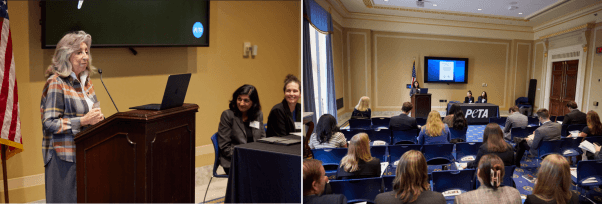Scientists Urge Congress to Ban NIH Funding of Foreign Animal Experiments
For Immediate Release:
September 18, 2024
Contact:
Tasgola Bruner 202-483-7382
At a congressional briefing hosted by Rep. Troy Nehls (R-Texas-22) today, scientists and a medical doctor warned Congress about research misconduct and animal abuse in laboratories outside the U.S. funded by the federal government. The experts urged legislators to support the bipartisan Cease Animal Research Grants Overseas (CARGO) Act (HR 4757), which would ban the National Institutes of Health (NIH) from funding animal experimentation in other countries.
Speakers included PETA Vice President of Laboratory Investigations Cases Dr. Alka Chandna, PETA neuroscientist Dr. Katherine Roe, and PETA Science Policy Advisor Donya Mand, M.D.
Every year, NIH forks over up to $300 million to foreign laboratories for experiments on animals—without any oversight of animal care.

- NIH doesn’t require foreign laboratories in Asia, Europe, South America, and elsewhere around the world to abide by the standards for the treatment of animals in U.S. laboratories—including mandatory inspections and oversight committees to review proposed experiments and ensure compliance with laws. Most foreign laboratories are never audited by NIH.
- The majority—69%—of research misconduct cases involve invasive experiments on animals, resulting in thousands of animals being harmed and killed for misleading data.
- More than 92% of the scientific papers retracted due to falsification of data or other misconduct were from foreign experimenters. NIH has no mechanisms in place to investigate or impose penalties for research misconduct at foreign institutions.
- Investing in poorly designed studies—particularly those reliant on animals without rigorous oversight—wastes taxpayer funds, squanders valuable intellectual and staffing resources, and results in missed opportunities to advance non-animal methods. This flawed research slows progress and robs doctors of the essential tools to provide effective care.
“The CARGO Act would prevent waste and fraud common in animal laboratories and allow for funding of animal-free, human-relevant research in the U.S. and all around the world,” says PETA Senior Vice President Kathy Guillermo. “The bill would cost Americans nothing and would very likely lead to better science—and that means treatments for human diseases.”
An 18-month PETA investigation into a laboratory in Colombia, for instance, revealed that experimenters violated animal care and use guidelines as well as local animal welfare laws, housed monkeys in filthy conditions and left them to die from their infected wounds, and forced mice into cannibalism—all while collecting more than $17 million of U.S. taxpayers’ money without producing a single treatment or cure for humans.
PETA also honored Nehls and Rep. Dina Titus (D-Nev.-01)—who introduced the CARGO Act—along with Sens. Cory Booker (D-N.J.) and Rand Paul (R-Ky.) with Congressional Leadership Awards for their outstanding work to protect animals and gave Rep. Earl Blumenauer (D-Ore.-03) a Lifetime Achievement Award for his many years of leadership and advocacy in behalf of animals.
PETA—whose motto reads, in part, that “animals are not ours to experiment on”—points out that Every Animal Is Someone and offers free Empathy Kits for people who need a lesson in kindness. For more information, please visit PETA.org or follow the group on X, Facebook, or Instagram.
Note: PETA supports animal rights, opposes all forms of animal exploitation, and educates the public on those issues. PETA does not directly or indirectly participate or intervene in any political campaign on behalf of or in opposition to any candidate for public office or any political party.


